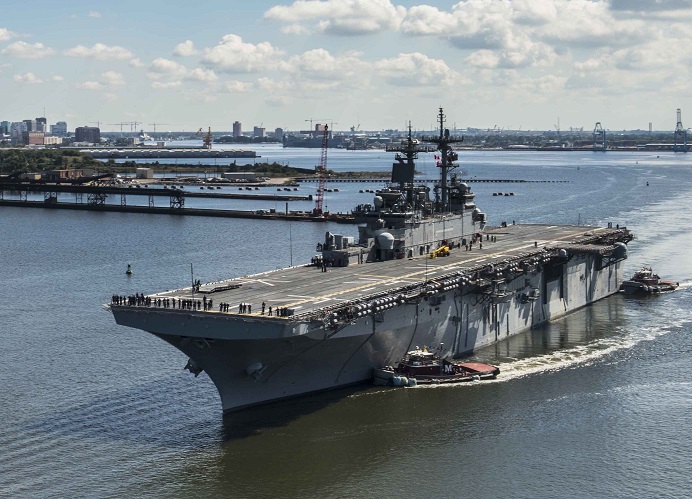China Rejects U.S. Warship’s Visit to Hong Kong
September 27, 2018 | Expert Insights

Beijing has denied entry to USS Wasp, an amphibious assault warship, to visit Hong Kong in the light of heightened tensions between the US and China.
Background
Incumbent US President Donald Trump has been vocally critic of China. He blames the country for the loss of jobs within the US. He has also often criticised their “very unfair and one-sided” trade relationship. President Trump said that US companies are forced to transfer intellectual properties if they want to do business in China and that a trade investigation has been started regarding this issue. According to the New York Times, America loses almost $600 billion a year to intellectual-property theft, and China is the main suspect.
The escalating trade war is spilling into diplomatic and military disengagements as well. Washington recently sanctioned the Chinese military for purchasing Russian armaments and China cancelled the high-level military talk which was scheduled for October.
The USS Wasp is a multipurpose amphibious assault ship, designed to accommodate new Landing Craft Air Cushion (LCAC) for fast troop movement over the beach, and Harrier II (AV-8B) Vertical/Short Take-Off and Landing (V/STOL) jets which provide close air support for the assault force. The ship can also accommodate the full range of Navy and Marine Corps helicopters, the tiltrotor MV-22 Osprey, the F-35B Lightning II multi-role fighter, conventional landing craft, and amphibious vehicles. It is stationed at Yokosuka Naval Base, Japan as part of the US Seventh Fleet.
Analysis
China rejected a request by an American warship to make a port visit to Hong Kong next month, reported officials from both nations, as tensions between the two countries flared on the military as well as economic fronts. The cancellation of a planned visit by the USS Wasp, an amphibious assault ship carrying a contingent of Marines, followed China’s decision to recall a senior admiral who was in the United States for a naval conference this week.
Both actions were prompted by a Trump administration decision to impose sanctions on a Chinese state military company linked to the People’s Liberation Army for buying weapons from Russia. Although the economic impact of the American action on the Chinese remains unclear, the vehemence of Beijing’s response suggests that the move stung.
The mounting military tensions came only three months after Defence Secretary Jim Mattis visited Beijing pledging “to keep our relationship on the right trajectory.” Instead, the relationship appears to be veering wildly off track as an escalating trade war becomes conflated with broader concerns in Washington about China’s policies.
The administration’s actions have coincided with aggressive steps by President Trump to impose tariffs on Chinese products. That has fueled the sentiment in Beijing that the deterioration of relations was not about trade policy as much as blunting China’s emergence as a world power. Even as news of the cancelled port call became public, China’s foreign ministry strongly denounced the Trump administration’s announcement of a new sale of $330 million in military equipment to Taiwan, the self-governing island democracy that Beijing claims as part of a united China.
Although the equipment amounted to spare parts for aircraft and other equipment and was less significant than previous packages approved by the Trump and Obama administrations, it signalled a return of routine arms sale with Taiwan. Taiwan’s foreign ministry welcomed the sale, saying on Twitter that it would enable the island “to maintain a robust self-defence.”
In Beijing, the Chinese foreign ministry spokesman, Geng Shuang, said the sale threatened to cause “severe damage” to relations with the United States, including “bilateral cooperation in major fields.”
The United States no longer formally recognizes Taiwan but has maintained close relations and is committed by law to help the island defend itself. Despite the US adopting the ‘One-China’ policy in the 1970s, Washington’s covert assistance to Taiwan has angered Beijing.
China appeared even more stunned by the decision to punish the state military company. The Trump administration announced last week that it would impose sanctions on the Chinese military’s Equipment Development Department and its director, Li Shangfu, for purchases of Su-35 fighter jets and S-400 surface-to-air missiles from Russia.
Counterpoint
Although the Chinese and American militaries have not been allies, exchanges and port visits have been common over the years. Last year, the USS Sterett, a guided-missile destroyer, visited one of China’s most sensitive naval bases, in Zhanjiang in southern China.
Such visits have nonetheless been subject to the ups and downs in the countries’ relations. In 2016, a planned visit to Hong Kong by an American aircraft carrier, the John C. Stennis, was rebuffed at a time when the Obama administration was becoming increasingly frustrated with China’s expansion of artificial islands in disputed territory in the South China Sea.
Assessment
Our assessment is that this cancellation is a retaliation for the sanctions placed on the Chinese military. Although a port visit does not represent a deep military agreement, it does represent a more amicable bilateral relationship between the two countries. We believe that the port visit to Hong Kong was cancelled as a show of defiance from Beijing by blocking the ship’s entry in its own waters. We also feel Washington may retaliate by proposing new naval exercises with Taiwan.








Comments